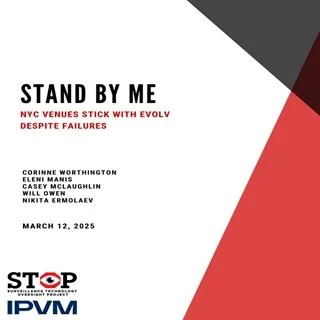By Corinne Worthington, Eleni Manis, Casey McLaughlin, Will Owen, and Nikita Ermolaev
Evolv is an AI weapon detector firm that has gained national attention following federal investigations, shareholder lawsuits, and close connections to Mayor Eric Adams. In this report, S.T.O.P. and IPVM present original research to reveal the high error rates and inaccuracy of Evolv weapon detectors in real-world conditions.
Key Findings Include:
Many of New York City’s biggest tourist venues waste huge sums of money leasing Evolv sensors that frequently misidentify weapons and everyday objects;
Venues continue to spend over 20 times the cost of comparable metal detectors on Evolv rentals, even as the company faces everything from federal investigations to lawsuits for false advertising and falsified earnings;
S.T.O.P. and IPVM observed Evolv walk-through scanners in use at five top New York City attractions: three museums, one performing arts venue, and a sports stadium, as well as a popular bowling alley for comparison with the city’s largest venues;
S.T.O.P. and IPVM’s research found Evolv sensors falsely claimed that one in four visitors had weapons, when, in practice, none did. On rainy days, the false alarm rate could reach 54%;
Operators routinely ignored alarms or responded with only a cursory check, making the alerts almost entirely meaningless.
NOTE: S.T.O.P. and IPVM jointly conducted this study, including fieldwork and data collection. IPVM’s contributions focused on engineering analysis, survey methodology, and technical background, while S.T.O.P. took the lead in drafting the final report. S.T.O.P. reached out to Evolv and the venues for comment but the venues either failed to reply or declined to comment.



